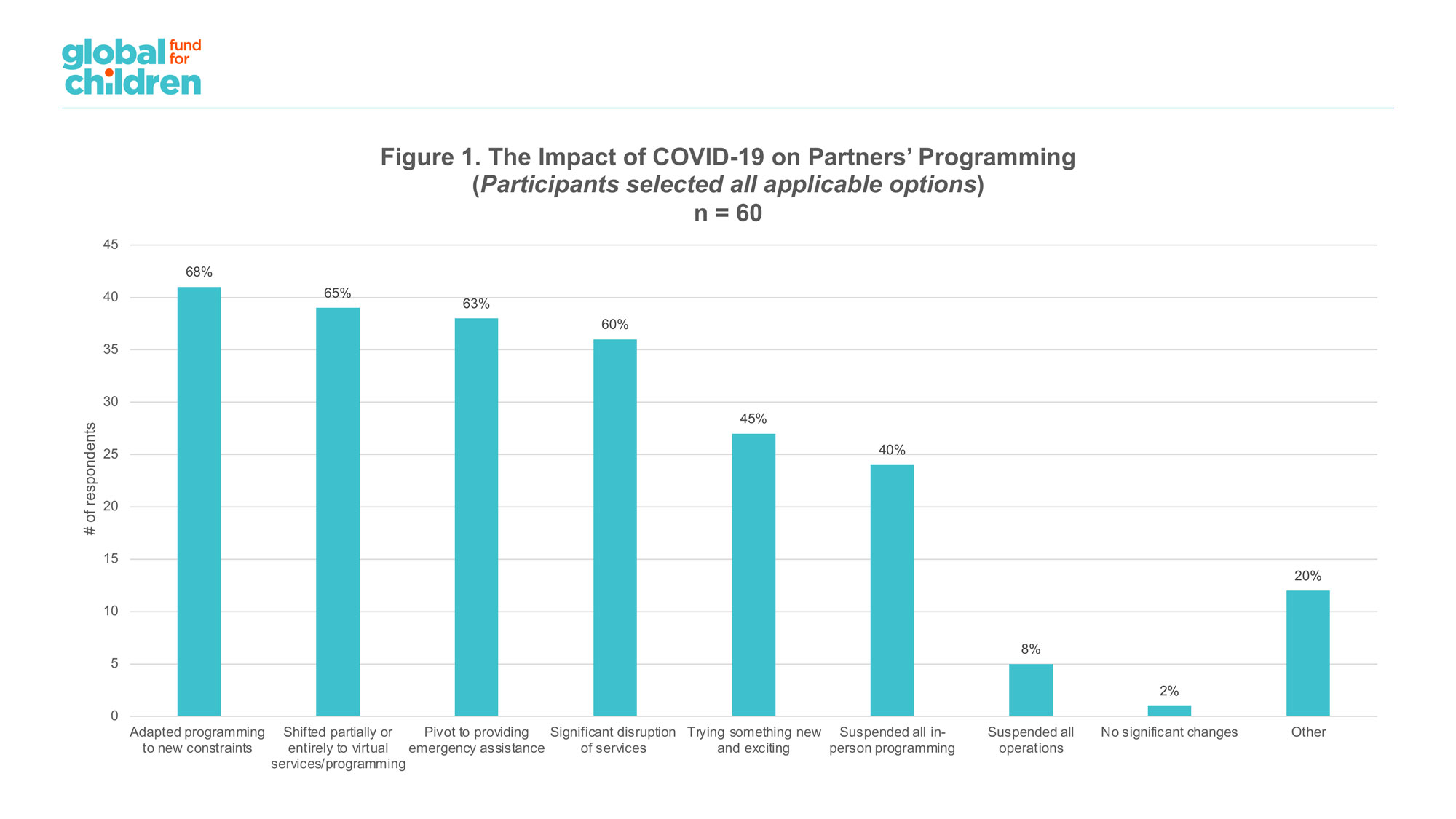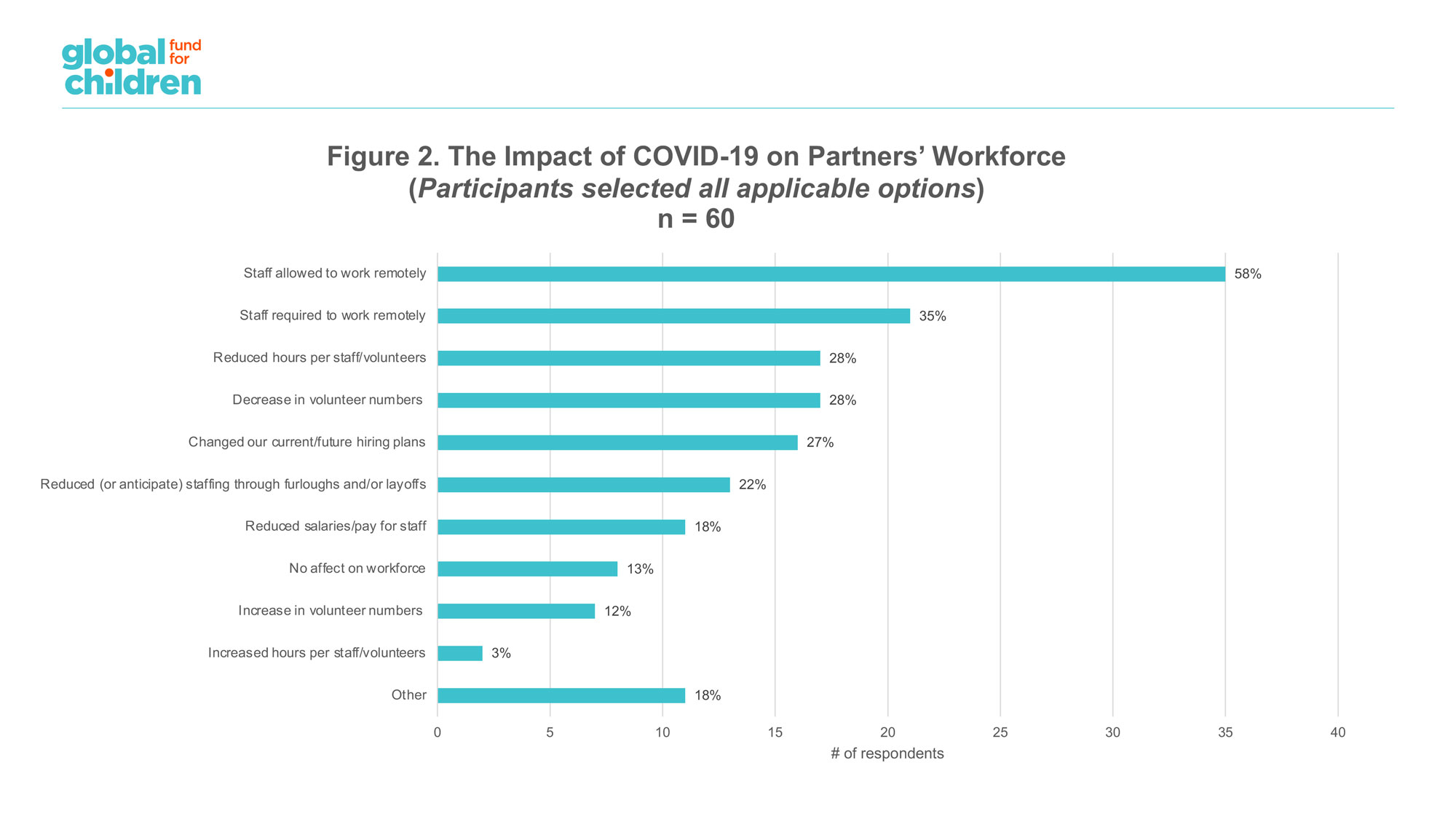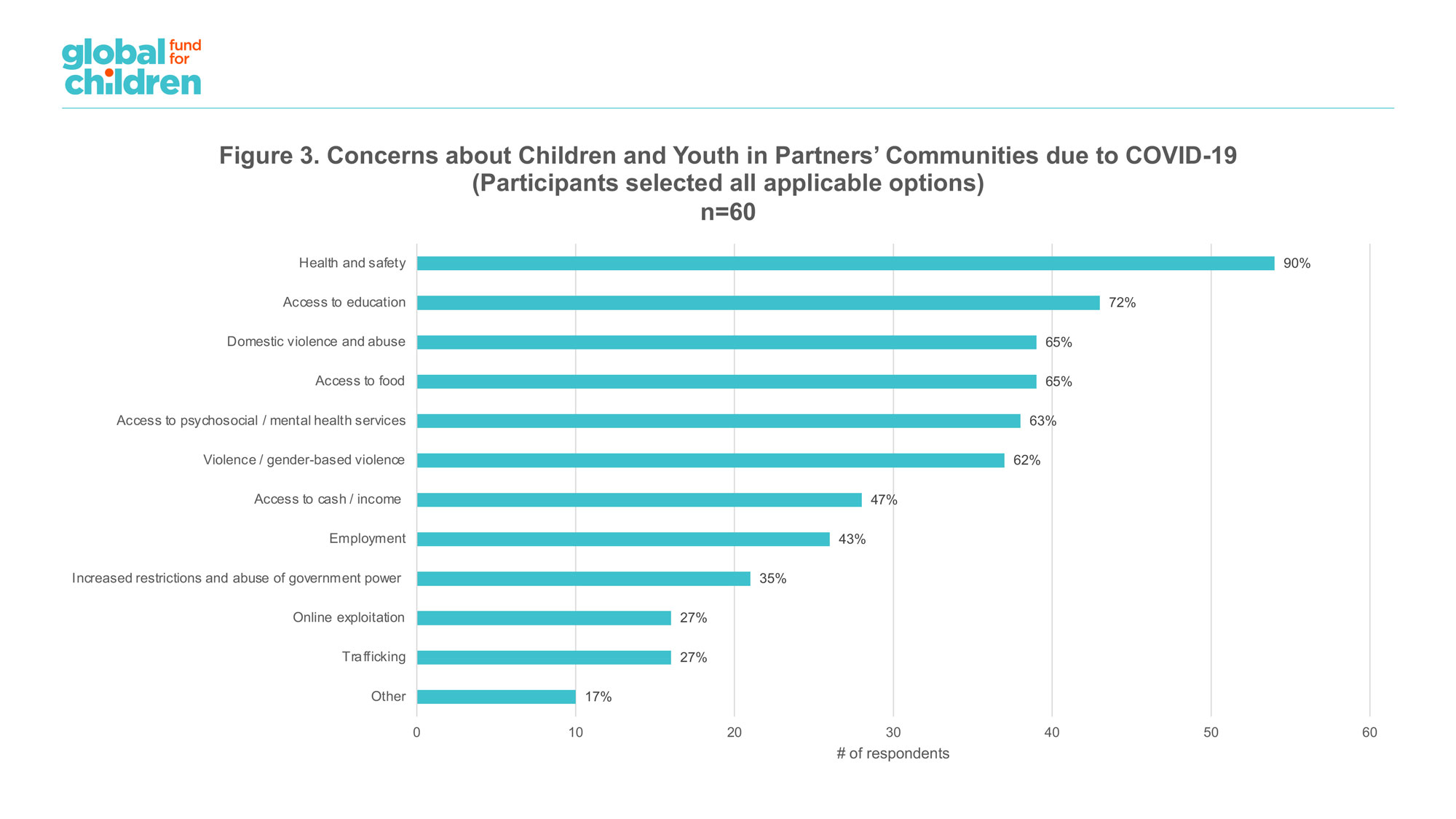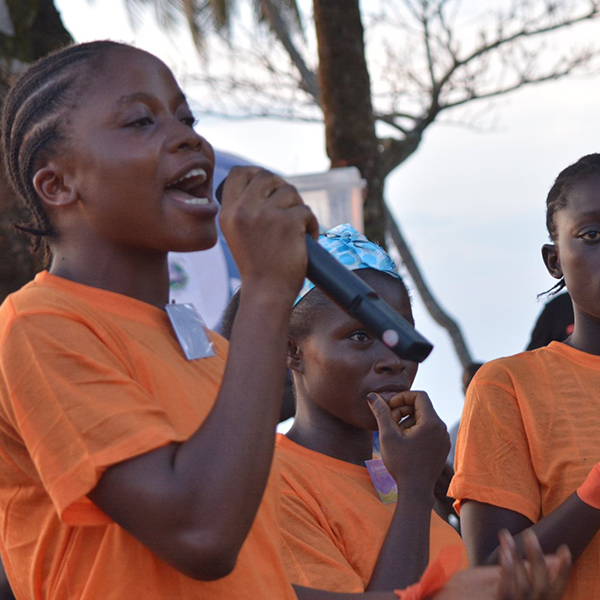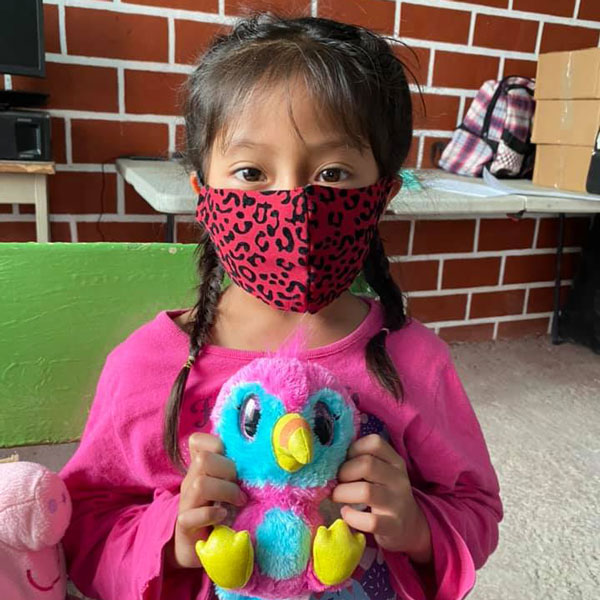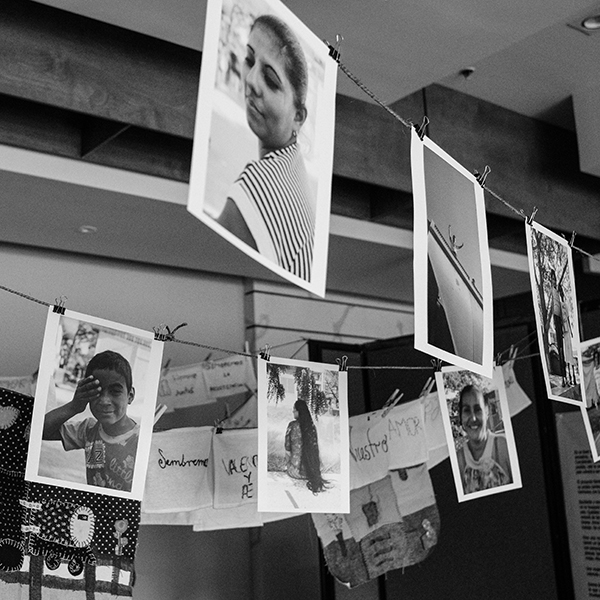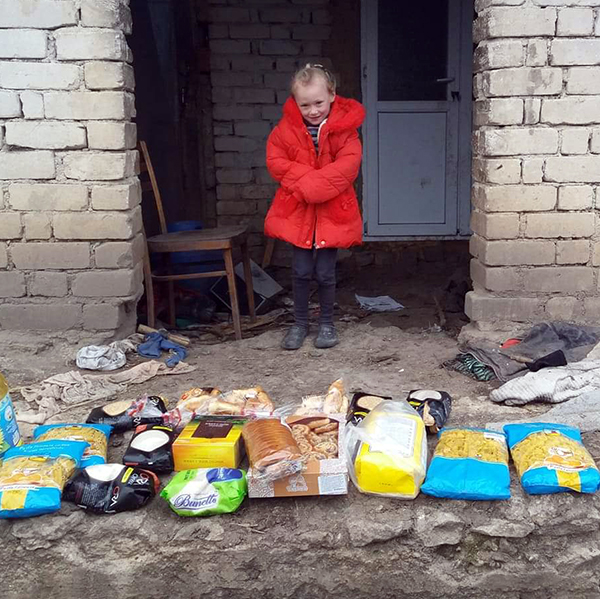As the global coronavirus pandemic ravages the globe, GFC wanted to find out how our partners are faring. They told us about the challenges they are facing and the worries they have, as well as the unique ways they are building resilience during this unprecedented moment.
The COVID-19 pandemic has disrupted nearly all aspects of life for the partner organizations GFC supports. In an effort to better understand the experiences of these community-based organizations during the pandemic, GFC conducted a global survey with 60 partners in July and August 2020. Partners told us how they were faring during this crisis. They provided feedback on the aspects of their organizations that were being most impacted, their worries about running their organizations, their concerns about the young people and communities they serve, and how they were coping and building resilience.
The GFC team developed the survey through a participatory process, and the anonymous questionnaire included both questions for which respondents could select from several applicable answer options and several open-ended questions. Of the 89 partners contacted, 60 participated in the survey, putting the overall response rate at 67%. More than 35% of respondents represent youth-led organizations (under 30 years old) and 61% identified as majority female organizations. In terms of the regional breakdown of the respondents, 35% were from the Americas, 30% from Asia, 23% from Africa, and 12% from Europe and Eurasia.
Concerns at the organizational level
In terms of overarching concerns about running their organizations, one of the major areas partners pointed to was the emotional health and wellbeing of staff (82%), followed closely by the physical health and safety of staff (78%), and uncertainty about the future (75%). (Partners could select more than one answer option.) One partner summarized their concerns like this:
“COVID-19 will almost certainly have lasting effects on communities. Will the sector have the energy to respond to these needs after the emergency response it has been delivering so far? Will there be resources around to support the sector to do so?”
Concerns about wellbeing come as no surprise. With restrictions in place around the world, many of the partners’ regular activities halted. In the survey, 58% of respondents said that staff at their organization were allowed to work remotely, and 35% reported that staff were required to work remotely. Working from home has turned work-life balance on its head. Staff at partner organizations are spreading themselves thin and finding it increasingly difficult to keep up. In particular, many women are struggling with an increased workload as they juggle jobs, household duties, and taking care of children whose schools are closed. More than 60% of our partners globally are maneuvering between providing emergency relief – something many of them had never done before – and continuing programming in a format adapted to new constraints.
Although 65% of respondents said that their staff had shifted partially or entirely to working virtually (see Figure 1), for many, access to technology and/or a reliable internet connection remains a challenge. An even bigger challenge for partners is reaching their program participants, since many of them are children and youth who do not have access to technology and/or internet. At the time of the survey, 40% of respondents had suspended all in-person programming. One partner reported:
“We have had to suspend face-to-face training activities aimed at adolescent girls, and working at a distance with them is complicated since the vast majority do not have a telephone or internet access …”
The financial uncertainty is another significant concern for our partners, with 38% reporting a significant reduction in funding, and 50% monitoring or reducing spending.
One of the biggest struggles partners reported was securing core funding as donors reoriented funds toward COVID-19 relief efforts, suspended grants that were normally renewed on an annual basis, and eliminated the possibility of future funding. A partner working to support adolescent girls expressed this worry: “We had applied [for funding] with another donor who told us that because of the situation, they had to change plans. This affects our work greatly, since one of our goals is to reach more girls, adolescents, and young women.” Other respondents mentioned that new funding opportunities were more restrictive in nature, that their grant applications were stuck in limbo, and that they were seeing a domino effect of funding cuts. One partner said:
“We have strong local donors and most of them are also affected by the COVID-19 pandemic, so our source of funding is also decreasing day by day.”
Beyond these challenges, partners provided examples of workforce concerns including staffing cuts, reduced hours, financial instability for staff and their families, and a decrease in volunteers (see Figure 2). Partners who have had to lay off staff expressed concern over shifting to more project-based, short-term hires, which could lead to a lack of continuity and trust in the community – something that is essential to our partners’ work.
Throughout the survey, partners from around the world also lamented the government response to the pandemic in their countries, from a lack of strong directives to a backlog at government agencies to unrealistically strict lockdown measures.
Concerns about children and youth
While partners acknowledge that the pandemic is a major concern for children and youth, many worry that other pressing issues that existed long before COVID-19 are being neglected and exacerbated. Some areas in which partners expect major setbacks to their work include child protection and safeguarding; violence prevention; access to education, income, and health and psychosocial services; and advocacy.
When asked to describe their concerns about the challenges facing children and young people in their communities (see Figure 3), health and safety came first (90%), followed by access to education (72%), domestic violence and abuse (65%), access to food (65%), and access to psychosocial and mental health services (63%).
Specific examples alarming partners included increased abuse, higher rates of early and forced marriage and pregnancy, increased rates of sexually transmitted infections (STI) and HIV, child labor and exploitation, and drug and alcohol abuse. One partner said:
“We have sourced 47 child sexual abuse cases through the Child Welfare Committee during the [COVID-19] period and have started working with the victims.”
Coping and building resilience
We asked partners to share how they are coping during the pandemic, and they shared the diverse ways in which they are adapting to the situation and building resilience:
- Partners are strengthening staff relationships and focusing on staff wellbeing. From a virtual speaker series to Zoom meditation, yoga classes, and learning circles, our partners are finding innovative ways to offer each other emotional support and to stay connected.
- Partners are introducing new programs for young people to build resilience. These activities include a new water, sanitation, and hygiene program to prevent the spread of COVID-19 and other related diseases; remote psychosocial support sessions for young people; and an outdoor agricultural training program.
- Partners are making connections with other groups. Partners are working with peer alliances to advocate for livelihood support; reaching out to international peers; connecting with new donors; increasing their online presence; raising awareness about their work through social media and local radio; and, in some cases, working more closely with the government.
- Partners are creating a reflective space within their organizations. They are creating space to reflect on the bigger picture of their work, focusing on professional development, revising plans and strategies, and improving communication materials.
- Partners are discovering online work. For some, moving services online and working remotely went smoother than expected, giving them the possibility of expanding online services to more people in the future. For others, conducting work online is ineffective or simply impossible, and they are using a hybrid model that combines virtual and in-person services.
What is GFC doing?
In March, GFC launched an Emergency Response Fund to issue immediate grants to our local partners. As of early November, we had approved $570,000 in emergency grants for 130 partners in 37 countries, but needs continue to grow. In addition, GFC has been continuously exploring and applying for funding opportunities around the world aimed at COVID-19 emergency relief, as well as longer-term planning.
GFC continues to support local organizations by providing unrestricted funding, capacity support, and assistance with safeguarding practices as partners shift from emergency relief to longer-term adaptation and resilience. Together, GFC and community organizations are planning responses that will help protect and empower young people both during and after COVID-19. GFC has also joined more than 700 funders in a call to action to strengthen the global COVID-19 response, calling for increased flexibility, support, and trust during a time of unprecedented hardship.
Early in the pandemic, the GFC team also pivoted to providing virtual support to our partners. Through regional partner calls, thematic conferences, webinars, and workshops co-designed with partners, as well as funding referrals, leadership dialogues, and increased check-ins and follow-ups, team members are going the extra mile to be supportive and responsive to our partners around the world.
Below, we have listed some suggestions for supporting grassroots partners:
- Provide flexible core funding, eliminate restrictions on current grants, and simplify reporting requirements. Our trust-based philanthropy model is founded on the belief that by providing flexible funding and placing our partners’ needs at the center, we can help our partners become more effective agents of change in their communities. There is no better time to prove this model than during a crisis. The feedback we have received from partners during the pandemic shows that being flexible with funding and reporting requirements eliminates barriers and allows our partners to focus on their work. The feedback also shows that many funders have not been as quick to adapt or change requirements. In the long run, an increase in flexible core funding would allow partners to adapt as they see fit and respond to emerging issues, rather than focusing efforts so heavily on specific projects dictated by funders.
- Support partners in strengthening individual and organizational wellbeing. In the survey, our partners cautioned that the psychological impacts of the pandemic on organizations and the communities they serve will be long-lasting. It is important for partners to find time to replenish their resources as individuals and as organizations. One of the ways GFC is focusing on wellbeing with partners is by fostering spaces during meetings, calls, and workshops to slow down, breathe, create, and be present in solidarity. We are also opening up discussions with our partners about what it means to practice collective care as organizations. By supporting our partners’ wellbeing, we are helping them support their communities.
- Be available and listen to partners. Making ourselves available to engage with our partners in the ways they need has never been more important. Since we are acutely aware of the pressure our partners are under, we are doing our best to minimize burdensome procedures in our relationships with them. While we realize the importance of meeting deadlines and submitting reports, we are trying to listen to what our partners need and to respond accordingly. Since the beginning of the pandemic, GFC has sought feedback from partners through surveys, ongoing check-ins from programs staff, and less formal channels such as WhatsApp and social media. We also asked partners who received emergency funding to tell us about their experience, and received overwhelmingly positive feedback regarding the ease and efficiency of distributing those funds.
- Influence peers in the funder community. One of the surest ways to help our partners is to convince other funders they work with to be more flexible, especially during a crisis. We believe that in an emergency context, being adaptable and kind go a long way. Advocating for our model and connecting partners with other funders will help grassroots organizations get the support they need now and in the future.
- Focus on supporting partners through capacity development. GFC believes that supporting partners with capacity development helps them become stronger and more effective organizations. This type of support goes beyond providing emergency support during a crisis or project-based funding; it gives our partners the opportunity to enhance the work they are already doing. In the long run, this approach creates change at the systems level and reinforces the value of a trust-based philanthropy model in which equitable partnerships allow for a better use of financial and non-financial resources. Ongoing capacity development support also better prepares organizations for crisis moments like the one we are living through now.
Learn more about how GFC is supporting children affected by the coronavirus – and how you can help.
Header photo: In Kolkata, India, before the pandemic lockdown, youth leaders from GFC alumni partner Prayasam painted communicative murals with COVID-19 prevention techniques. © Prayasam
